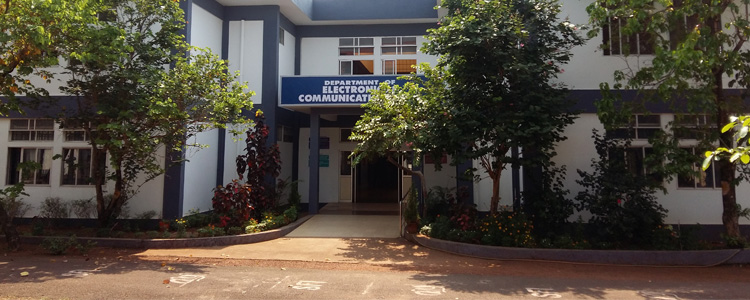
The department of Electronics and Communication is infact the pride and honor of the college. The department has seen tremendous growth ever since the establishment of the college. The Department has always been on a high growth path and has experienced and dedicated faculty with a strong commitment to engineering education. The department has an annual intake of 63 students.
Vision
To provide valuable resources for industry and society through excellence in electronics and communication engineering.
Mission
- Educate students with the state of art technologies to meet the growing challenges of the industry
- Undertake collaborative projects with academia and industry
- Equip students with strong foundation for higher studies
Programme Educational Objectives (PEOs)
- Prepare graduates with fundamental knowledge in mathematics, science and engineering fields to develop problem solving skills for the career advancement in electronics and communication and allied disciplines
- Prepare graduates with strong practical and theoretical knowledge in electronics and communication Engineering, contributing to society through interdisciplinary projects, research, entrepreneurial skills and leadership
- Prepare graduates with a professional outlook who can communicate effectively and interact responsibly with colleagues, clients, employer and the society
- Prepare graduates who will pursue lifelong learning and professional development including post graduate education
Programme Outcomes (POs)
- Engineering Knowledge : Apply the knowledge of mathematics, science, engineering fundamentals and Electrical and Electronics engineering to the solution of complex engineering problems.
- Problem Analysis : Identify, formulate review research literature, and analyze complex engineering problems reaching substantiated conclusions using first principles of mathematics, natural sciences and engineering sciences
- Design/Development of solutions: Design solutions for complex engineering problems and design system components or processes that meet the specified needs with appropriate consideration for the public health and safety, and the cultural, societal and environmental considerations.
- Conduct investigations of complex problems : Use research-based knowledge and research methods including design of experiments, analysis and interpretation of data, and synthesis of the information to provide valid conclusions.
- Modern tool usage : Create, select, and apply appropriate techniques, resources and modern engineering and IT tools including prediction and modeling to complex engineering activities with an understanding of the limitations.
- The Engineer and Society : Apply reasoning informed by the contextual knowledge to assess societal, health, safety, legal and cultural issues and the consequent responsibilities relevant to the professional engineering practice
- Environmental and sustainability: Understand the impact of the professional engineering solutions in societal and environmental contexts, and demonstrate the knowledge of, and need for sustainable development.
- Ethics : Apply ethical principles and commit to professional ethics and responsibilities and norms of the engineering practice.
- Individual and Team work : Function effectively as an individual, and as a member or leader in diverse teams and in multi-disciplinary settings.
- Communication : Communicate effectively on complex engineering activities with the engineering community and with society at large, such as, being able to comprehend and write effective reports and design documentation, make effective presentation, and give and receive clear instruction
- Project management and finance : Demonstrate knowledge and undertaking of engineering and management principles and apply these to one's own work, as a member and leader in a team, to manage projects in multi-disciplinary environments
- Life-long learning : Recognize the need for, and have the preparation and ability to engage in independent and life-long learning in the broadest context of technological change
PROGRAM SPECIFIC OUTCOMES (PSO)
- Ability to apply the fundamental knowledge to solve the problems ethically in Electronics and Communication Engineering field by realizing constraints such as economic , environmental,social and sustainability,and understand its impact on societal and environmental context.
- Ability to design and implement Electronic systems and innovative projects using modern engineering and IT tools to meet industrial standards and thus adapt technological changes ,individually and as a team.
The Laboratories available in the Electronics & Communication Department are:
- Basic Electronics Lab
- Electronic Circuits Lab
- Digital Electronics Lab
- Microprocessor Lab
- Communication engineering Lab
- Digital Signal Processing Lab
- Embedded System Lab
- Project Lab(EDA Tools,HFSS,Spectrum Analyzer)
Association Activities
Association Organizes lectures, seminars and technical talks by distinguished personalities. It also hosts workshops, exhibitions and competitions like instant logic quiz, paper presentation, code debugging and many more.
Faculty details
Student Details
| Yaer | Female | Male | Grand Total | For more details |
|---|---|---|---|---|
| 2023-24 (First Year) | 31 | 31 | 62 | Click here....... |
| 2022-23 (Second Year) | 25 | 37 | 62 | Click here....... |
| 2021-22 (Third Year) | 16 | 17 | 33 | Click here....... |
| 2020-21 (Forth Year) | 17 | 26 | 43 | Click here....... |
| 2019-20 | 21 | 10 | 31 | Click here....... |
| 2018-19 | 15 | 13 | 28 | Click here....... |

